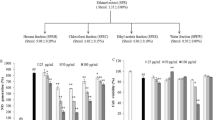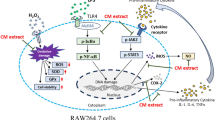Abstract
Sea cucumber, Holothuria scabra, is an echinoderm marine animal that has long been used as a traditional therapeutic in various diseases due to its chemical composition and protein enrichment. Many researchers have extensively studied the efficacy of sea cucumber extracts for many health benefits in recent years. Inflammation is a complex process involved in pro-/anti-inflammatory cytokine products. However, the role of the H. scabra extracts in anti-inflammation and its molecular regulations has not been apparently elucidated yet. In this study, we investigated the anti-inflammatory effect of H. scabra extracts by using lipopolysaccharide (LPS) from E. coli to induce an inflammatory response in RAW264.7 macrophage. It was found that ethyl acetate fraction of H. scabra extracts (EAHS) inhibited pro-inflammatory cytokines synthesis at both the transcriptional and translational levels, notably nitric oxide (NO), inducible nitric oxide synthase (iNOS), interleukin-1β (IL-1β), tumor necrosis factor-α (TNF-α), and prostaglandin E2 (PGE2). In addition, EAHS was able to downregulate IκB/NF-κB, and JNK expressions. These effects may be influenced by high contents of phenolic compound and triterpene glycosides in EAHS. Therefore, EAHS might have the potential to be developed as a natural anti-inflammatory agent.






Similar content being viewed by others
References
Aminin DL, Menchinskaya ES, Pisliagin EA, Silchenko AS, Avilov SA, Kalinin VI (2015) Anticancer activity of sea cucumber triterpene glycosides. Mar Drugs 13:1202–1223. https://doi.org/10.3390/md13031202
Aoki T, Narumiya S (2012) Prostaglandins and chronic inflammation. Trends Pharmacol Sci 33:304–311. https://doi.org/10.1016/j.tips.2012.02.004
Caivano M (1998) Role of MAP kinase cascades in inducing arginine transporters and nitric oxide synthetase in RAW264 macrophages. FEBS Lett 429:249–253. https://doi.org/10.1016/s0014-5793(98)00578-x
Calay ES, Hotamisligil GS (2013) Turning off the inflammatory, but not the metabolic, flames. Nat Med 19:265–267
Dyshlovoy SA et al (2016) The marine triterpene glycoside frondoside A exhibits activity in vitro and in vivo in prostate cancer. Int J Cancer 138:2450–2465. https://doi.org/10.1002/ijc.29977
Himaya SW, Ryu B, Qian ZJ, Kim SK (2010) Sea cucumber, Stichopus japonicus ethyl acetate fraction modulates the lipopolysaccharide induced iNOS and COX-2 via MAPK signaling pathway in murine macrophages. Environ Toxicol Pharmacol 30:68–75. https://doi.org/10.1016/j.etap.2010.03.019
Hommes DW, Peppelenbosch MP, van Deventer SJ (2003) Mitogen activated protein (MAP) kinase signal transduction pathways and novel anti-inflammatory targets. Gut 52:144–151
Hussein SZ, Mohd Yusoff K, Makpol S, Mohd Yusof YA (2013) Gelam honey attenuates carrageenan-induced rat paw inflammation via NF-kappaB pathway. PLoS ONE 8:e72365. https://doi.org/10.1371/journal.pone.0072365
Intayoung P, Limtrakul P, Yodkeeree S (2016) Antiinflammatory activities of crebanine by inhibition of NF-κB and AP-1 activation through suppressing MAPKs and Akt signaling in LPS-induced RAW264.7 macrophages. Biol Pharm Bull 39:54–61. https://doi.org/10.1248/bpb.b15-00479
Kaminska B (2009) Molecular characterization of inflammation-induced JNK/c-Jun signaling pathway in connection with tumorigenesis. In: Kozlov SV (ed) Inflammation and cancer: methods and protocols: volume 2: molecular analysis and pathways, Humana Press, Totowa, pp. 249–264. doi: 10.1007/978-1-60327-530-9_13.
Kim SK, Himaya SW (2012) Triterpene glycosides from sea cucumbers and their biological activities. Adv Food Nutr Res 65:297–319. https://doi.org/10.1016/b978-0-12-416003-3.00020-2
Lawrence T (2009) The nuclear factor NF-κB pathway in inflammation. Cold Spring Harb Perspect Biol 1:a001651. https://doi.org/10.1101/cshperspect.a001651
Li Y et al (2017) Immune regulation mechanism of astragaloside IV on RAW2647 cells through activating the NF-κB/MAPK signaling pathway. Int Immunopharmacol 49:38–49. https://doi.org/10.1016/j.intimp.2017.05.017
Li L, Sapkota M, Kim S-w, Soh Y (2015) Herbacetin inhibits inducible nitric oxide synthase via JNK and nuclear factor-κB in LPS-stimulated RAW2647 cells. Eur J Pharmacol 765:115–123. https://doi.org/10.1016/j.ejphar.2015.08.032
Ma C, Wang Y, Dong L, Li M, Cai W (2015) Anti-inflammatory effect of resveratrol through the suppression of NF-kappaB and JAK/STAT signaling pathways. Acta Biochim Biophys Sin 47:207–213. https://doi.org/10.1093/abbs/gmu135
Mitu SA et al (2017) Evidence for a saponin biosynthesis pathway in the body wall of the commercially significant sea cucumber Holothuria scabra. Mar Drugs 15:349. https://doi.org/10.3390/md15110349
Mondol MAM, Shin HJ, Rahman MA, Islam MT (2017) Sea cucumber glycosides: chemical structures, producing species and important biological properties. Mar Drugs 15:317. https://doi.org/10.3390/md15100317
Nguyen BCQ, Yoshimura K, Kumazawa S, Tawata S, Maruta H (2017) Frondoside a from sea cucumber and nymphaeols from okinawa propolis: natural anti-cancer agents that selectively inhibit PAK1 in vitro. Drug Discoveries Therapeutics 11:110–114. https://doi.org/10.5582/ddt.2017.01011
Park S-Y, Lim HK, Lee S, Cho SK, Park S, Cho M (2011) Biological effects of various solvent fractions derived from Jeju Island red sea cucumber (Stichopus japonicas). J Korean Soc Appl Biol Chem 54:718–724. https://doi.org/10.1007/BF03253150
Paul A et al (1999) Involvement of mitogen-activated protein kinase homologues in the regulation of lipopolysaccharide-mediated induction of cyclo-oxygenase-2 but not nitric oxide synthase in RAW 2647. Macrophages Cellular Signalling 11:491–497. https://doi.org/10.1016/S0898-6568(99)00018-2
Prasad S, Tyagi AK, Aggarwal BB (2014) Recent developments in delivery, bioavailability, absorption and metabolism of curcumin: the golden pigment from golden spice. Cancer Res Treat 46:2–18. https://doi.org/10.4143/crt.2014.46.1.2
Salih M, Ahmed W, Garelnabi E, Osman Z, Osman B, Khalid H, Mohamed M (2014) Secondary metabolites as anti-inflammatory agents. Eur J Med Chem 3:257
Sangpairoj K et al (2016) Extract of the sea cucumber holothuria scabra, induces apoptosis in human glioblastoma cell lines. Functional Foods Health Dis 6:452–468
Sharma JN, Al-Omran A, Parvathy SS (2007) Role of nitric oxide in inflammatory diseases. Inflammopharmacology 15:252–259. https://doi.org/10.1007/s10787-007-0013-x
Stone WL, Yang H, Qui M (2006) Assays for nitric oxide expression. Methods in molecular biology (Clifton, NJ) 315:245–256
Tripathi P, Tripathi P, Kashyap L, Singh V (2007) The role of nitric oxide in inflammatory reactions. FEMS Immunol Med Microbiol 51:443–452. https://doi.org/10.1111/j.1574-695X.2007.00329.x
van Meerloo J, Kaspers GJ, Cloos J (2011) Cell sensitivity assays: the MTT assay. Methods in molecular biology (Clifton, NJ) 731:237–245. https://doi.org/10.1007/978-1-61779-080-5_20
Vo VA et al (2014) N-(p-Coumaryol)-Tryptamine suppresses the activation of JNK/c-Jun signaling pathway in LPS-challenged RAW2647 cells. Biomol Ther (Seoul) 22:200–206. https://doi.org/10.4062/biomolther.2014.013
Wei J, Zhang X, Bi Y, Miao R, Zhang Z, Su H (2015) Anti-Inflammatory effects of cumin essential oil by blocking JNK, ERK, and NF-κB signaling pathways in LPS-stimulated RAW 264.7 cells. Evid Based Complement Alternat Med 2015:1–8. https://doi.org/10.1155/2015/474509
White ES, Mantovani AR (2013) Inflammation, wound repair, and fibrosis: reassessing the spectrum of tissue injury and resolution. J Pathol 229:141–144. https://doi.org/10.1002/path.4126
Whitehouse MW, Fairlie DP (1994) Anti–inflammatory activity of a holothurian (sea cucumber) food supplement in rats. InflammoPharmacol 2:411–417. https://doi.org/10.1007/BF02678607
Yu H, Pardoll D, Jove R (2009) STATs in cancer inflammation and immunity: a leading role for STAT3. Nat Rev Cancer 9:798–809. https://doi.org/10.1038/nrc2734
Yu S, Ye X, Huang H, Peng R, Su Z, Lian XY, Zhang Z (2015) Bioactive sulfated saponins from sea cucumber Holothuria moebii. Planta Med 81:152–159. https://doi.org/10.1055/s-0034-1383404
Zhou Y, Wang J, Yang W, Qi X, Lan L, Luo L, Yin Z (2017) Bergapten prevents lipopolysaccharide-induced inflammation in RAW2647 cells through suppressing JAK/STAT activation and ROS production and increases the survival rate of mice after LPS challenge. Int Immunopharmacol 48:159–168. https://doi.org/10.1016/j.intimp.2017.04.026
Acknowledgements
This work was supported by Agriculture Research Development Agency (Public Organization), Thailand to Prof. Prasert Sobhon, Research Fund, and the Central Instrument Facility (CIF) grant, Faculty of Science, Mahidol University, Bangkok, Thailand.
Author information
Authors and Affiliations
Corresponding author
Ethics declarations
Conflict of interest
The authors declared that they have no conflict of interest.
Additional information
Publisher's Note
Springer Nature remains neutral with regard to jurisdictional claims in published maps and institutional affiliations.
Rights and permissions
About this article
Cite this article
Pranweerapaiboon, K., Apisawetakan, S., Nobsathian, S. et al. An ethyl-acetate fraction of Holothuria scabra modulates inflammation in vitro through inhibiting the production of nitric oxide and pro-inflammatory cytokines via NF-κB and JNK pathways. Inflammopharmacol 28, 1027–1037 (2020). https://doi.org/10.1007/s10787-019-00677-3
Received:
Accepted:
Published:
Issue Date:
DOI: https://doi.org/10.1007/s10787-019-00677-3




